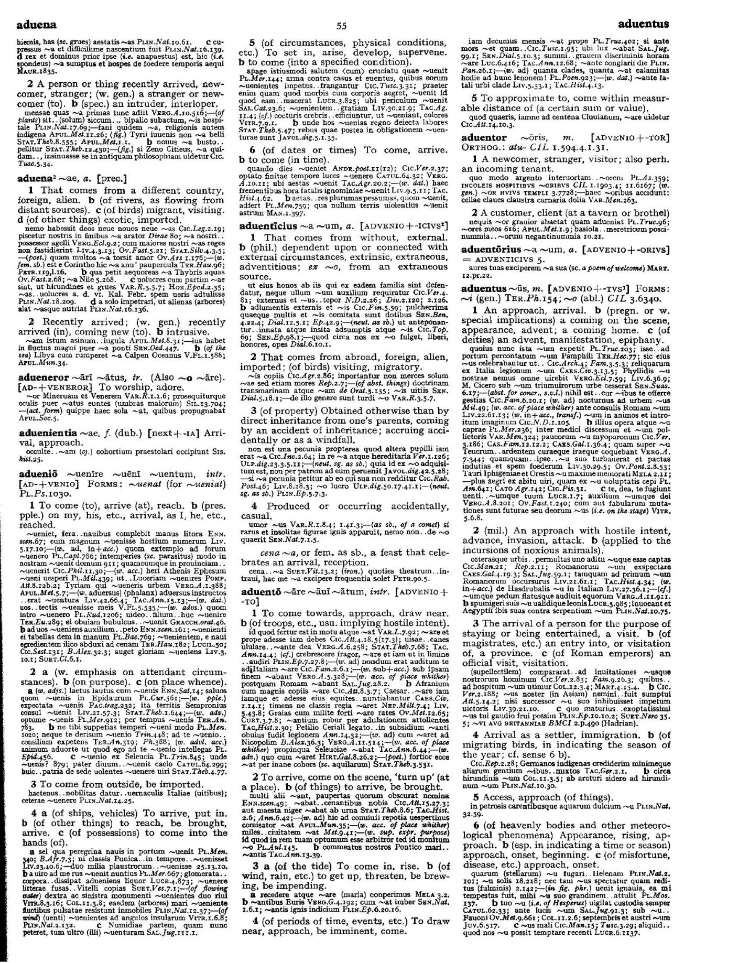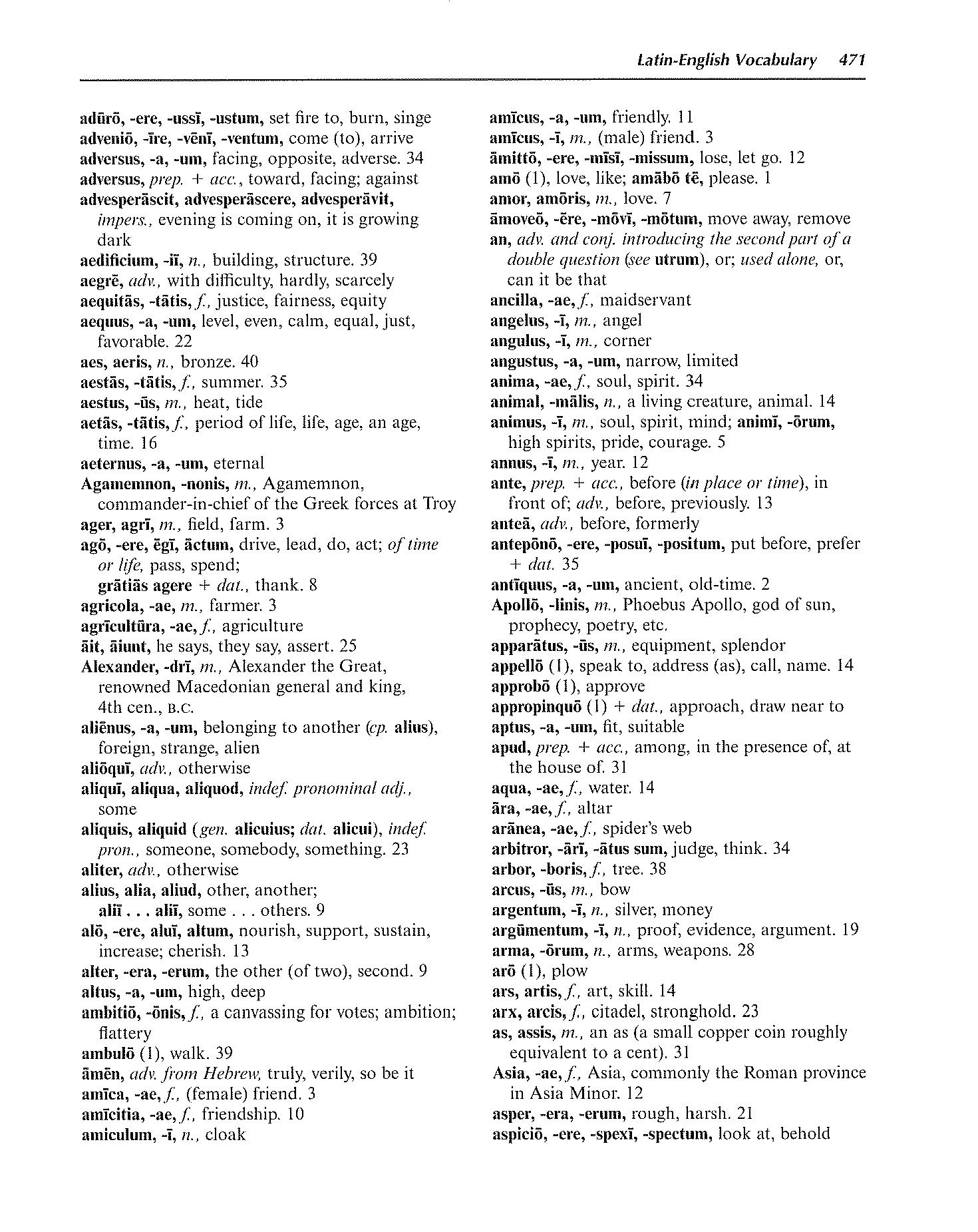
page_listing.tpl
page_subListingDetails.tpl
sub_listingDetails_style1.tpl
sub_listingDetails.title.tpl
advenīre to arrive
advenīre is a Latin Verb that primarily means to arrive.
Definitions for advenīre
Wheelock's Latin
Verb
- 1
come (to), arrive
Oxford Latin Dictionary
Verb
- 1
To come (to), arrive (at), reach. (b) (pres. pple.) on my, his, etc., arrival, as I, he, etc., reached.
- 2
(a) (w. emphasis on attendant circumstances). (b) (on purpose). (c) (on place whence).
- 3
To come from outside, be imported.
- 4
(a) (of ships, vehicles) To arrive, put in. (b) (of other things) to reach, be brought, arrive. (c) (of possessions) to come into the hands (of).
- 5
(of circumstances, physical conditions, etc.) To set in, arise, develop, supervene. (b) to come (into a specified condition).
Sentences with advenīre
Latin to English
Multas per gentes et multa per aequora vectus advenio has miseras, frater, ad inferias, ut te postremo donarem munere mortis et mutam nequiquam alloquerer cinerem.Compare By ways remote and distant waters sped, Brother, to thy sad grave-side am I come, that I may give the last gifts to the dead, and vainly parley with thine ashes dumb. (Tr. Aubrey Beardsley)
Ad urbem tribus diēbus advenīre volēbat.Compare He wanted to reach the city in three days.
Syphax cum quinquaginta mille pedes, decem eques advenio.Compare Syphax arrive with fifty thousand foot and ten thousand horsemen.
Conjugation table for advenīre
Cactus2000
| ACTIVE | |
| Indicative present | Indicative imperfect |
| adveniō advenīs advenit advenīmus advenītis adveniunt | adveniēbam adveniēbās adveniēbat adveniēbāmus adveniēbātis adveniēbant |
| Indicative perfect | Indicative pluperfect |
| advēnī advēnistī advēnit advēnimus advēnistis advēnērunt / advēnēre | advēneram advēnerās advēnerat advēnerāmus advēnerātis advēnerant |
| Indicative future | Indicative future perfect |
| adveniam adveniēs adveniet adveniēmus adveniētis advenient | advēnerō advēneris advēnerit advēnerimus advēneritis advēnerint |
| Subjunctive present | Subjunctive imperfect |
| adveniam adveniās adveniat adveniāmus adveniātis adveniant | advenīrem advenīrēs advenīret advenīrēmus advenīrētis advenīrent |
| Subjunctive perfect | Subjunctive pluperfect |
| advēnerim advēneris advēnerit advēnerimus advēneritis advēnerint | advēnissem advēnissēs advēnisset advēnissēmus advēnissētis advēnissent |
Infinitive present advenīre Infinitive perfect advēnisse Infinitive future adventūrum esse | Imperative present advenī advenīte Imperative future advenītō advenītō advenītōte adveniuntō |
| Indicative present | Indicative imperfect |
| - - advenītur - - - | - - adveniēbātur - - - |
| Indicative perfect | Indicative pluperfect |
| - - adventus est - - - | - - adventus erat - - - |
| Indicative future | Indicative future perfect |
| - - adveniētur - - - | - - adventus erit - - - |
| Subjunctive present | Subjunctive imperfect |
| - - adveniātur - - - | - - advenīrētur - - - |
| Subjunctive perfect | Subjunctive pluperfect |
| - - adventus sit - - - | - - adventus esset - - - |
Infinitive present advenīrī Infinitive perfect adventum esse Infinitive future adventum īrī | Imperative present - - Imperative future - advenītō - - |
| PARTICIPLE | ||
| Participle present active | ||
| Nom. | adveniēns | advenientēs |
| Gen. | advenientis | advenientium |
| Dat. | advenientī | advenientibus |
| Acc. | advenientem | advenientēs |
| Abl. | adveniente | advenientibus |
| Participle future active | ||
| Nom. | adventūrus | adventūrī |
| Gen. | adventūrī | adventūrōrum |
| Dat. | adventūrō | adventūrīs |
| Acc. | adventūrum | adventūrōs |
| Abl. | adventūrō | adventūrīs |
| Participle perfect passive | ||
| Nom. | adventus | adventī |
| Gen. | adventī | adventōrum |
| Dat. | adventō | adventīs |
| Acc. | adventum | adventōs |
| Abl. | adventō | adventīs |
| Gerundive | ||
| Nom. | adveniendus | adveniendī |
| Gen. | adveniendī | adveniendōrum |
| Dat. | adveniendō | adveniendīs |
| Acc. | adveniendum | adveniendōs |
| Abl. | adveniendō | adveniendīs |
| Gerund | Supine | |
| Nom. | advenīre | adventum |
| Gen. | adveniendī | adventū |
| Dat. | adveniendō | |
| Acc. | adveniendum | |
| Abl. | adveniendō | |
Data sources
Notes
- Definitions
- Frederick M. Wheelock, Wheelock's Latin, 6th ed., rev. Richard A. LaFleur (New York, NY: HarperCollins Publishers, 2005): 471.
- P. G. W. Glare, Oxford Latin Dictionary, Vols. 1-8 (Oxford: Clarendon Press, 1982): 55.
- Word frequencies
- Christopher Francese, "Latin Core Vocabulary," Dickinson College Commentaries, last modified 2014, http://dcc.dickinson.edu.
- Paul B. Diederich, The Frequency of Latin Words and Their Endings, PhD diss., (Columbia University, 1939).
Bibliography
Allen, Joseph H. Allen and Greenough's New Latin Grammar for Schools and Colleges: Founded on Comparative Grammar. Edited by James B. Greenough, George L. Kittredge, Albert A. Howard, and Benjamin L. D'Ooge. Boston, MA: Ginn & Company, 1903.
Crystal, David. A Dictionary of Linguistics and Phonetics. 6th ed. Oxford, UK: Blackwell Publishing, 2008.
Delatte, Louis, Suzanne Govaerts, Joseph Denooz, and Etienne Evrard. Dictionnaire fréquentiel et index inverse de la langue latine [Frequency Dictionary and Inverse Index of the Latin Language]. Liège, Belgium: Laboratoire d'analyse statistique des langues anciennes de l'Université de Liège (L.A.S.L.A.), 1981.
Diederich, Paul B. The Frequency of Latin Words and Their Endings. PhD diss., Columbia University, 1939.
Francese, Christopher. "Latin Core Vocabulary." Dickinson College Commentaries. Last modified 2014. http://dcc.dickinson.edu/latin-vocabulary-list.
Gildersleeve, Basil L., and Gonzales Lodge. Gildersleeve's Latin Grammar: Third Edition, Revised, and Enlarged. 3rd ed. London, England: Macmillan and Co., 1903.
Glare, Peter G.W. Oxford Latin Dictionary. Vols. 1-8. Oxford, England: Clarendon Press, 1982.
Krüger, Bernd. "Latin Conjugation Tables." Cactus2000. Accessed May 5, 2023. https://latin.cactus2000.de/index.en.php.
Pierson, Nick. "Sound of Text." Accessed October 26, 2019. https://soundoftext.com.
Wheelock, Frederick M. Wheelock's Latin. 6th ed. Revised by Richard A. LaFleur. New York, NY: HarperCollins Publishers, 2005.
Wiktionary Contributors. "Victionarium." Wikimedia Foundation, Inc. Updated March 18, 2019. https://la.wiktionary.org/wiki/Victionarium:Pagina_prima.
Citation
Chicago (17th ed.)
Allo Contributors. "adveniō, advenīre, advēnī, adventum (v.) - Latin Word Definition." Allo Latin Dictionary. Last modified . Accessed February 19, 2026. http://ancientlanguages.org/latin/dictionary/advenio-advenire-adveni-adventum.
Entry created on . Last updated on .







